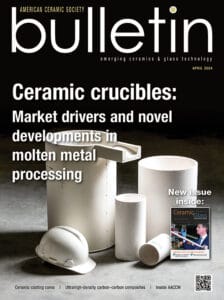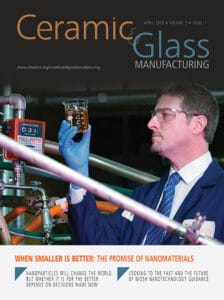Advanced structural ceramics and composites are enabling materials for applications in various industries including energy generation and storage, environment, space, transportation, medicine, microelectronics, and optical systems. High mechanical reliability is a key issue for their ultimate use in short- to very long-term applications. Identification and quantification of failure mechanisms by fracture, fatigue and/or irreversible deformation are essential, as well as their correlation with structure, processing, and exposure to severe service conditions. Extreme environments and challenging applications of ceramic materials have necessitated new approaches for manufacturing and characterization. Furthermore, the development of novel methods to advance and accelerate computationally driven materials characterization and validate structure/property relationship models is needed to improve prediction of material behavior and lower costs.
This symposium solicits abstracts related to the diverse aspects of mechanical behavior of ceramics and composites and their correlations with processing and component performance and reliability.
Proposed Session Topics
- Mechanical characterization of ceramics and composites, techniques & equipment
- Small-scale testing and in-situ characterization using photons & neutrons
- Fracture mechanics, failure analysis and fractography
- Environmental effects, thermo-mechanical performance, and tribology
- Design, reliability and life prediction modeling of devices and components
- Novel computational approaches to enhance performance and characterization
- Processing – microstructure – mechanical properties correlation
- Role of fibers, matrices, coatings, and interfaces in mechanical behavior
- Functionally graded materials and multilayer ceramic systems
- Manufacturing and testing of joined and integrated components and structures
- Ceramics for energy generation, turbines, and environmental applications
Symposium Organizers
- Amjad Almansour, NASA Glenn Research Center, USA
- Dong (Lilly) Liu, University of Bristol, UK
- Jonathan Salem, NASA Glenn Research Center, USA
- Monica Ferraris, Politecnico di Torino, Italy
- Gerard Vignoles, University of Bordeaux, France
- Raul Bermejo, Montanuniversitaet Leoben, Austria
- Craig Przybyla, Air Force Research Laboratory, USA
- Dietmar Koch, University of Augsburg, Germany
- Emmanuel Maillet, GE Research, USA
- Andrew Wereszczak, Oak Ridge National Laboratory, USA
- Kevin Strong, Sandia National Laboratory, USA
Points of Contact
- Amjad Almansour: amjad.s.almansour@nasa.gov
- Dong (Lilly) Liu: dong.liu@bristol.ac.uk
- Jonathan Salem: jonathan.a.salem@nasa.gov
- Monica Ferraris: monica.ferraris@polito.it
- Gerard Vignoles: vinhola@lcts.u-bordeaux.fr
Subscribe to Ceramic Tech Today

Don’t miss the latest ceramic and glass materials news. Receive the CTT newsletter to your email three times a week by subscribing at this link.
Subscribe to Ceramic & Glass Manufacturing Weekly

Don’t miss the latest ceramic and glass business news. Receive the C&GM Weekly newsletter to your email every Monday by subscribing at this link.


